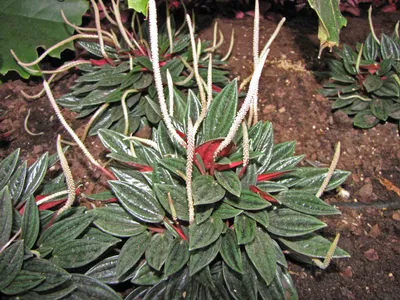The Ultimate Care Guide for Emerald Ripple Peperomia

The Ultimate Care Guide for Emerald Ripple Peperomia
Emerald Ripple Peperomia (Peperomia caperata) is a stunning and low-maintenance houseplant that adds charm to any indoor space. Its textured, heart-shaped leaves with deep ridges and a lush green or reddish hue make it a favorite among plant enthusiasts. If you’re looking to keep your Emerald Ripple Peperomia thriving, follow these essential care tips.
1. Light Requirements
Emerald Ripple Peperomia thrives in bright, indirect light. Place it near a north or east-facing window where it can receive filtered sunlight. Avoid direct sun exposure, as this can scorch its delicate leaves. If your home has low light, you can supplement with artificial grow lights.
2. Watering Routine
Peperomias have succulent-like characteristics, which means they store some moisture in their leaves. Water your plant when the top inch of soil feels dry. Overwatering can lead to root rot, so always use a pot with drainage holes. In the winter months, reduce watering as the plant’s growth slows down.
3. Humidity & Temperature
Emerald Ripple Peperomia prefers a humid environment but adapts well to average household humidity. To boost humidity:
- Place a small tray with water and pebbles under the pot.
- Mist the plant occasionally.
- Group it with other plants to create a mini humid environment.
It thrives in temperatures between 18-26°C (65-80°F). Keep it away from cold drafts and sudden temperature changes.
4. Soil & Potting
A well-draining, light, and airy soil mix is best for Peperomia caperata. Use a blend of:
- 50% potting mix
- 25% perlite
- 25% orchid bark or coconut coir
Repotting is rarely needed since Peperomias have a compact root system. Refresh the soil every 2-3 years to maintain plant health.
5. Fertilizing Schedule
Feed your plant with a balanced liquid fertilizer diluted to half strength once a month during the growing season (spring and summer). Avoid fertilizing in the fall and winter when the plant is dormant.
6. Pruning & Maintenance
Regular pruning helps maintain a compact shape and encourages new growth. Remove any yellowing or damaged leaves with clean, sharp scissors.
7. Common Issues & Solutions
- Yellowing Leaves – Often due to overwatering; allow the soil to dry out between waterings.
- Drooping Leaves – Usually a sign of underwatering or extreme temperature changes.
- Pest Problems – Rare, but watch for spider mites and mealybugs. Wipe the leaves with a neem oil solution if pests appear.
Final Thoughts
Emerald Ripple Peperomia is a fantastic choice for beginners and seasoned plant lovers alike. With minimal care, it will reward you with its unique foliage and compact, bushy growth. Keep these tips in mind, and your Peperomia will flourish for years to come!
Looking to add more houseplants to your collection? Explore our selection at Nabtaty and find the perfect plant for your home!



Comments : 0